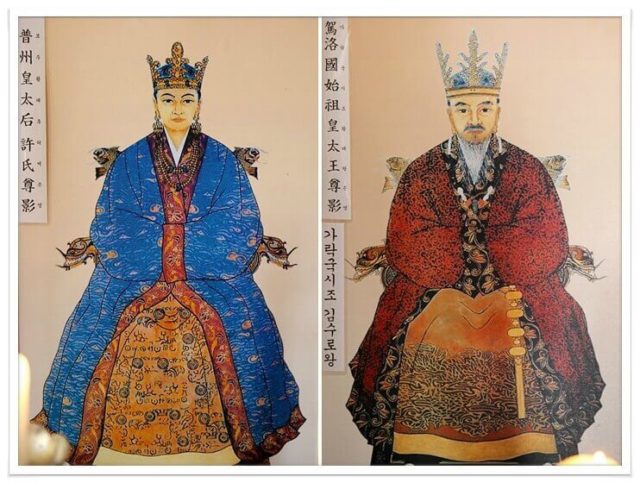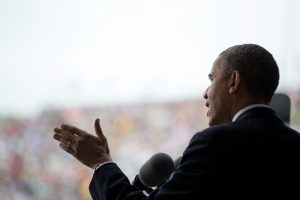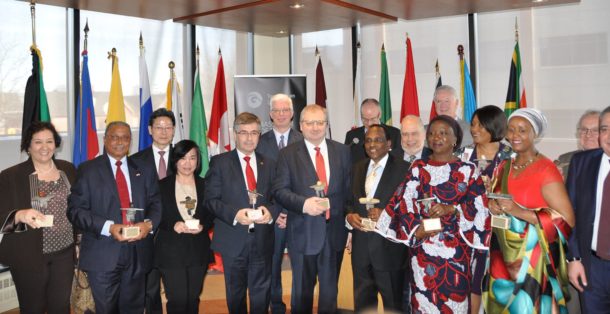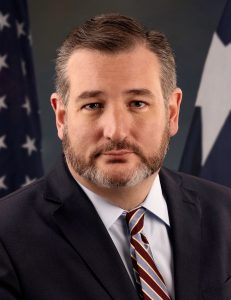John Jojin, koreatimes.co.kr For an explanation of the above photo illustrating quote ancient Indian-Korean ties, see the below statement: "The visit of the Korean first lady last year on the occasion of Deepotsva celebrations in the Indian state of Uttar Pradesh, appealed to a large number of Indians, who are otherwise not familiar with either Korea or India-Korea relations. Her visit popularized the Korean myth of a nuptial connection between a Korean king and an Indian princess dating back two millennia, which was hitherto not well known in India. For more details on this relationship, see (where this image appears)
For an explanation of the above photo illustrating quote ancient Indian-Korean ties, see the below statement: "The visit of the Korean first lady last year on the occasion of Deepotsva celebrations in the Indian state of Uttar Pradesh, appealed to a large number of Indians, who are otherwise not familiar with either Korea or India-Korea relations. Her visit popularized the Korean myth of a nuptial connection between a Korean king and an Indian princess dating back two millennia, which was hitherto not well known in India. For more details on this relationship, see (where this image appears)
The recently concluded visit of the Indian Prime Minister Narendra Modi to Seoul on Feb. 21 and 22, was the latest in a row of many high-profile exchanges between India and Korea. President Moon Jae-in visited Delhi in July 2018, followed by first lady Kim Jung-sook in November. Korean defense and foreign ministers also travelled to India in September and December 2018 respectively to meet their counterparts.
Prime Minister Modi's visit itself shows the importance of Korea for New Delhi, as it came in the middle of a busy political season in India with a general election expected to happen in two or three months. Modi also broke the pattern of a once a term leadership visit between the two countries. During his previous visit in May 2015, the bilateral relationship was upgraded to a "Special Strategic Partnership."
During the summit, Prime Minister Modi and President Moon agreed to strengthen the military and defense ties and inked six MOUs including an agreement to set up a Korea Startup Hub in India. The highlight of the visit has been public events of the prime minister, including the award ceremony of the Seoul Peace Prize, which was conferred on Modi last October, a ceremony unveiling the bust of Mahatma Gandhi and a meeting with the Mayor of Gimhae, reflecting an emphasis on the social and cultural dimension of the relationship.
Of late efforts have been made by both countries in reaching out through various means including high-level visits, cultural and public diplomacy initiatives to improve their visibility and in spreading knowledge of India-Korea ties. Well-crafted social media intervention of Prime Minister Modi and President Moon has produced a positive impact in this direction.
The visit of the Korean first lady last year on the occasion of Deepotsva celebrations in the Indian state of Uttar Pradesh, appealed to a large number of Indians, who are otherwise not familiar with either Korea or India-Korea relations. Her visit popularized the Korean myth of a nuptial connection between a Korean king and an Indian princess dating back two millennia, which was hitherto not well known in India. As a result of many such efforts the optics of India-Korea relations have never been better.
Over the last decade, India-Korea relations have emerged to become a comprehensive and multi-dimensional partnership. Among other things leadership also played an important role. After coming to power in 2014, Prime Minister Modi declared "Korea a crucial partner in India's economic modernization" and an "indispensable partner" in India's "Act East Policy" (AEP). President Moon in 2017, announcing the New Southern Policy (NSP), a strategy to strengthen Seoul's relations with India complemented Modi's approach.
A new dynamism in bilateral relations, facilitated by the convergence of interests in AEP and NSP was witnessed during President Moon's visit to India last year. The joint vision document adopted at the July 2018 Summit demonstrated a strong will and determination of the top leadership to advance bilateral relations, with a focus on three pillars, namely, people, prosperity and peace.
Recently Korea has become an important partner in Prime Minister Modi's development projects including Make in India, Smart City and Sagarmala, marking the emergence of a "developmental partnership" between the two countries. An example of this is the Korean financial support of $10 billion for three mega infrastructure projects in the state of Maharashtra.
Under the Special Strategic Partnership, trade and economic relations have also improved. Bilateral trade has crossed $21 billion compared to $20 billion in 2017 and $15.7 billion in 2016. To further liberalize trade, New Delhi and Seoul are currently negotiating to upgrade the Comprehensive Economic Partnership Agreement (CEPA), which was signed in 2009. An interim agreement of an "Early Harvest Package" was announced during the visit of President Moon and also set the goal of achieving $50 billion bilateral trade by 2030.
As far as investment relations is concerned, Korea is the 13th largest source of FDI in India with an estimated investment of $ 3.2 billion. Of late Korean investment in India is witnessing an upward trend with announcements of new projects including Hyundai Motors's $1 billion in Chennai, Kia Motor's $2 billion in Andhra Pradesh and Samsung's expansion of its Noida plant.
Defense production has recently emerged to become an important sector for bilateral relations, with India looking at Korea as a promising partner for diversifying its defense supplies and modernizing its defense industry, while Korea sees India as a potential defense market. A major highlight of the defence production cooperation is the partnership between India's Larsen & Toubro (L&T) and Korea's Samsung-Techwin to produce K-9 Vajra howitzers for the Indian Army. Recently Indian Military selected Korean built Biho self-propelled anti-aircraft defense system as the only candidate qualified for acquisition.
In a context where India and Korea find greater convergence of interest through the meeting of Act East Policy and the New Southern Policy, the visit of Prime Minister Modi provided an excellent opportunity to consolidate the bilateral relations.
The author (johnjojin@gmail.com) is a research fellow at the Indian Council of World Affairs, New Delhi and coordinates India-Korea track 1.5 Dialogue. The views expressed are that of the author and not of the council.
Original Article
India-Korea bonhomie: ‘Act east’ meets ‘new southern policy’
Views: 2







